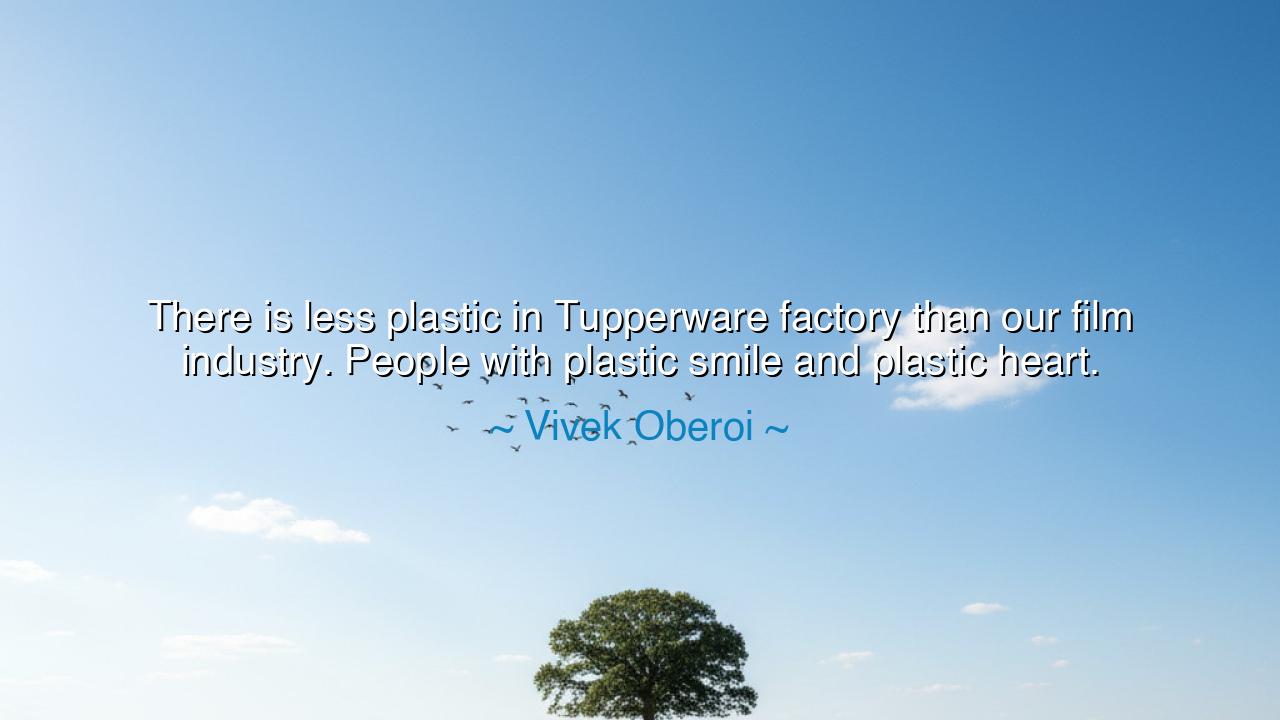
There is less plastic in Tupperware factory than our film
There is less plastic in Tupperware factory than our film industry. People with plastic smile and plastic heart.






Hearken, O seeker of wisdom, and consider the words of Vivek Oberoi: “There is less plastic in Tupperware factory than our film industry. People with plastic smile and plastic heart.” Within this vivid observation lies a timeless teaching on authenticity, integrity, and the nature of human character. It is a warning that outward appearances, no matter how polished, may conceal hearts that are untrue and emotions that are hollow.
From the earliest days, sages and philosophers warned against the seduction of falsehood. Plato, in his allegory of the cave, revealed the dangers of illusion: many perceive shadows and polished surfaces as truth while the essence of reality remains unseen. Oberoi’s metaphor resonates with this ancient truth: the “plastic smile” is a shadow of sincerity, a superficial gesture unmoored from genuine feeling, a reminder that not all that glitters reflects the heart’s substance.
Consider the life of Julius Caesar and the Roman Senate. Among those who bowed and smiled in public were men whose ambitions and envy were hidden behind courteous faces. Brutus, once a friend, concealed betrayal beneath politeness and honor. The lesson is clear: appearances can deceive, and the true measure of a person lies not in the smile they wear for the crowd, but in the integrity that guides their unseen actions.
There is heroism in recognizing the difference between surface and substance. To discern authenticity amid duplicity is to cultivate wisdom and moral clarity. The ancients revered those who could read hearts beyond gestures, who valued honesty and sincerity over the polished veneer of falsehood. Oberoi’s words remind us that a society, a community, or a profession flourishes not on appearance alone, but on the honesty of its participants.
Even in modern history, this truth manifests clearly. In the court of Elizabeth I, courtiers often presented courteous smiles, yet many harbored envy or schemes for power. The queen’s survival and the prosperity of her reign depended on discerning the sincerity of those around her, understanding that plastic smiles often accompanied plastic hearts. Oberoi’s reflection calls attention to the enduring challenge of authenticity in human relations.
The lesson is profound: evaluate character by deeds and consistency, not merely by the outward expression of smiles or charm. The heart’s substance, the moral and ethical core, is the true measure of virtue. While false gestures may deceive for a time, only those who cultivate genuine compassion, courage, and integrity leave lasting impact.
From this reflection, practical counsel arises: guard your own heart against falsehood, value sincerity in others, and learn to read beyond appearances. Encourage transparency, kindness, and honesty in interactions, and question the motives that hide behind polished expressions. In doing so, one fosters genuine relationships and strengthens the moral fabric of the community.
Thus, let each heart carry this ancient wisdom: a smile may delight, a gesture may charm, but only a sincere heart sustains trust, honor, and respect. Vivek Oberoi reminds us that authenticity transcends surface beauty; it is the foundation of enduring influence, lasting connection, and true greatness. By valuing substance over appearance, one cultivates a life and a society rich in meaning and integrity.
If you wish, I can also craft a short, audio-ready version of this reflection, with natural rises and pauses, emphasizing emotional depth and moral clarity for narration. Do you want me to create that version?






AAdministratorAdministrator
Welcome, honored guests. Please leave a comment, we will respond soon